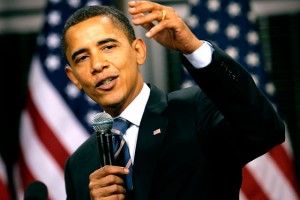
Publisher:
Bonnie King
CONTACT:
Newsroom@Salem-news.com
Advertising:
Adsales@Salem-news.com

~Truth~
~Justice~
~Peace~
TJP
Apr-26-2012 17:46

 TweetFollow @OregonNews
TweetFollow @OregonNews
US: US Restrictions on Burma Should be Linked to Measurable Progress
Letter by William Gomes Salem-News.comSalem-News Human Rights Ambassador William Gomes contacts US President Obama over relaxation of the investment ban and other sanctions on Burma.
 US President Barack Obama |
(HONG KONG) - The United States is at a crossroad once again, with the ability to politically make or break a critical situation in a country that drastically needs to change its course, one of the world's longstanding human rights violators: Burma.
 |
The US government has to retain its political leverage until real reform in Burma occurs. In spite of advancements and by-elections that have taken place, Burma's move toward democracy is more of a crawl, and all of this aside, it is a fact that basic political power remains with the military junta that has caused so much grief in this place.
The Obama Administration’s plans for relaxation of the investment ban and other sanctions on Burma that were announced by Secretary of State Hillary Clinton on April 4, 2012, may be a signal that American politics are moving in the wrong direction. This proposed US policy may not best serve the goal of measured progress toward political reforms in Burma.
The Administration should maintain the investment ban as a whole and progressively exempt certain sectors only after determining that investment in the designated sectors would clearly benefit the people of Burma and not exacerbate human rights violations, corruption and/or nepotism. Investment in additional sectors could be permitted over time, as conditions warrant.
| “ |
Dear President Obama, I am William Nicholas Gomes, Human Rights Ambassador for Salem News.com. I would like to express my concern regarding the Administration’s plans for relaxation of the investment ban and other sanctions on Burma that were announced by Secretary of State Hillary Clinton on April 4, 2012. I appreciate that the discussions on how to proceed are ongoing and that a final decision has not been made. However, I am concerned that the proposed direction of US policy may not best serve the goal of measured progress toward political reforms in Burma. Despite holding by-elections and taking other positive steps, the government has yet to institute the reforms necessary to move Burma toward democracy, and basic political power remains with the military. It is imperative for the United States to retain its leverage until real reform occurs. As a Human Rights Ambassador, I do support the broad position the US government has taken, namely, to gradually relax sanctions in a way that is tied to progress. A gradual approach enables the US government to engage and influence the Burmese government in a direction that supports genuine and sustained political reform towards democratization, durable peace, and improved respect for human rights. I worry, however, that the Administration may be moving forward in a way that will undermine those goals. I strongly believe that any further movement to relax the current financial transactions and investment bans be sequenced and timed in a manner that reflects actual additional progress toward the necessary political reforms and progress to improve human rights in Burma. As noted below, I believe the best approach in the immediate future is to conduct a comprehensive update of the Specially Designated Nationals (SDN) list before relaxing the investment and financial services bans. In the medium term, the US needs to work with civil society and ethnic nationality leaders in Burma to develop binding standards for US companies doing business in Burma, and then lift restrictions for only a few sectors, carefully selected with participation of the US Treasury Department as well as Burmese civil society, democratic opposition groups, and ethnic nationality leaders. I also believe that the Administration should communicate more effectively to Congress its overall policy objectives and proposed approach regarding Burma, and make clear that current sanctions relaxations are contingent and should continue to be executed by waivers, not underlying legislative change, and that Congress will need to reauthorize underlying sanctions legislation as needed throughout the year. As stated above, we believe it is premature to relax the financial transactions and investment bans until a comprehensive update of the SDN list has taken place. I also believe that any relaxation of the bans should be accompanied by a clear statement that investment will not be permitted with Burmese entities if the ownership or management of those entities is in any way connected to persons who remain on the SDN list, or entities owned and/or controlled by the Burmese military. If these precautions are not taken, new US business activity permitted under the relaxation may directly benefit individuals and entities responsible for human rights abuses, who contribute to corruption, or are otherwise acting to obstruct political reform. I note that the current SDN list has not been updated comprehensively in several years. I believe it is vital to consult with the Treasury Department and determine when a comprehensive update can be completed, and to further consult with Treasury to ensure the appropriate resources are in place to enforce targeted sanctions in future, before any significant revision to current policy takes effect. Once these measures have been taken, we recommend that the Administration consider relaxing the ban on financial transactions before adjusting the investment ban. Moreover, I urge that the Administration maintain the investment ban as a whole and progressively exempt certain sectors only after the US government has determined that investment in the designated sectors would clearly be beneficial to the people of Burma and not exacerbate human rights violations, corruption and/or nepotism. Investment in additional sectors could be permitted over time, as conditions warrant. I do not support the alternative approach of singling out only certain sectors or industries for continued imposition of the investment ban while ending the investment ban on all other sectors. I am concerned that this approach would send a signal to investors that all non-designated sectors are relatively free from the problems noted above. Moreover, this approach deprives the Administration of opportunities to learn lessons from individual sectors to examine actual benefits of investment for the people of Burma. I also urge that new rules be developed setting out core requirements for responsible, rights-respecting trade and investment in Burma. The US should begin now to consult with civil society inside and outside Burma to develop strong accountability and transparency measures for businesses active in Burma. I am providing below a list of outstanding issues in Burma on which the US government shouldcontinue to promote progress. I do not suggest that all these criteria must be met before the Administration takes any further action. Rather, I would urge you to be aware that while someimportantsteps have been taken there is much progress still to be made to advance structural and institutional reform. It would be important to time the offering of any further incentives to the Burmese government in a way that recognizes the long road ahead. As a Human Rights Ambassador I share the view that the gradual easing of US restrictions on Burma should be linked to measurable progress on the outstanding issues below:
Thank you for your consideration of these points. I am grateful for my continued engagement with senior leadership of your administration on these important issues. |
” |

Salem-News.com Human Rights Ambassador William Nicholas Gomes is a Bangladeshi journalist, human rights activist and author was born on 25 December, 1985 in Dhaka. As an investigative journalist he wrote widely for leading European and Asian media outlets.
He is also active in advocating for free and independent media and journalists’ rights, and is part of the free media movement, Global Independent Media Center – an activist media network for the creation of radical, accurate, and passionate telling of the truth. He worked for Italian news agency Asianews.it from year 2009 to 2011, on that time he was accredited as a free lance journalist by the press information department of Bangladesh. During this time he has reported a notable numbers of reports for the news agency which were translated into Chinese and Italian and quoted by notable number of new outlets all over the world.He, ideologically, identifies himself deeply attached with anarchism. His political views are often characterized as “leftist” or “left-wing,” and he has described himself as an individualist anarchist.
 |
 |
 |
 |
 |
 |
 |
Articles for April 25, 2012 | Articles for April 26, 2012 | Articles for April 27, 2012
Quick Links
DINING
Willamette UniversityGoudy Commons Cafe
Dine on the Queen
Willamette Queen Sternwheeler
MUST SEE SALEM
Oregon Capitol ToursCapitol History Gateway
Willamette River Ride
Willamette Queen Sternwheeler
Historic Home Tours:
Deepwood Museum
The Bush House
Gaiety Hollow Garden
AUCTIONS - APPRAISALS
Auction Masters & AppraisalsCONSTRUCTION SERVICES
Roofing and ContractingSheridan, Ore.
ONLINE SHOPPING
Special Occasion DressesAdvertise with Salem-News
Contact:AdSales@Salem-News.com

googlec507860f6901db00.html



Terms of Service | Privacy Policy
All comments and messages are approved by people and self promotional links or unacceptable comments are denied.
[Return to Top]
©2025 Salem-News.com. All opinions expressed in this article are those of the author and do not necessarily reflect those of Salem-News.com.